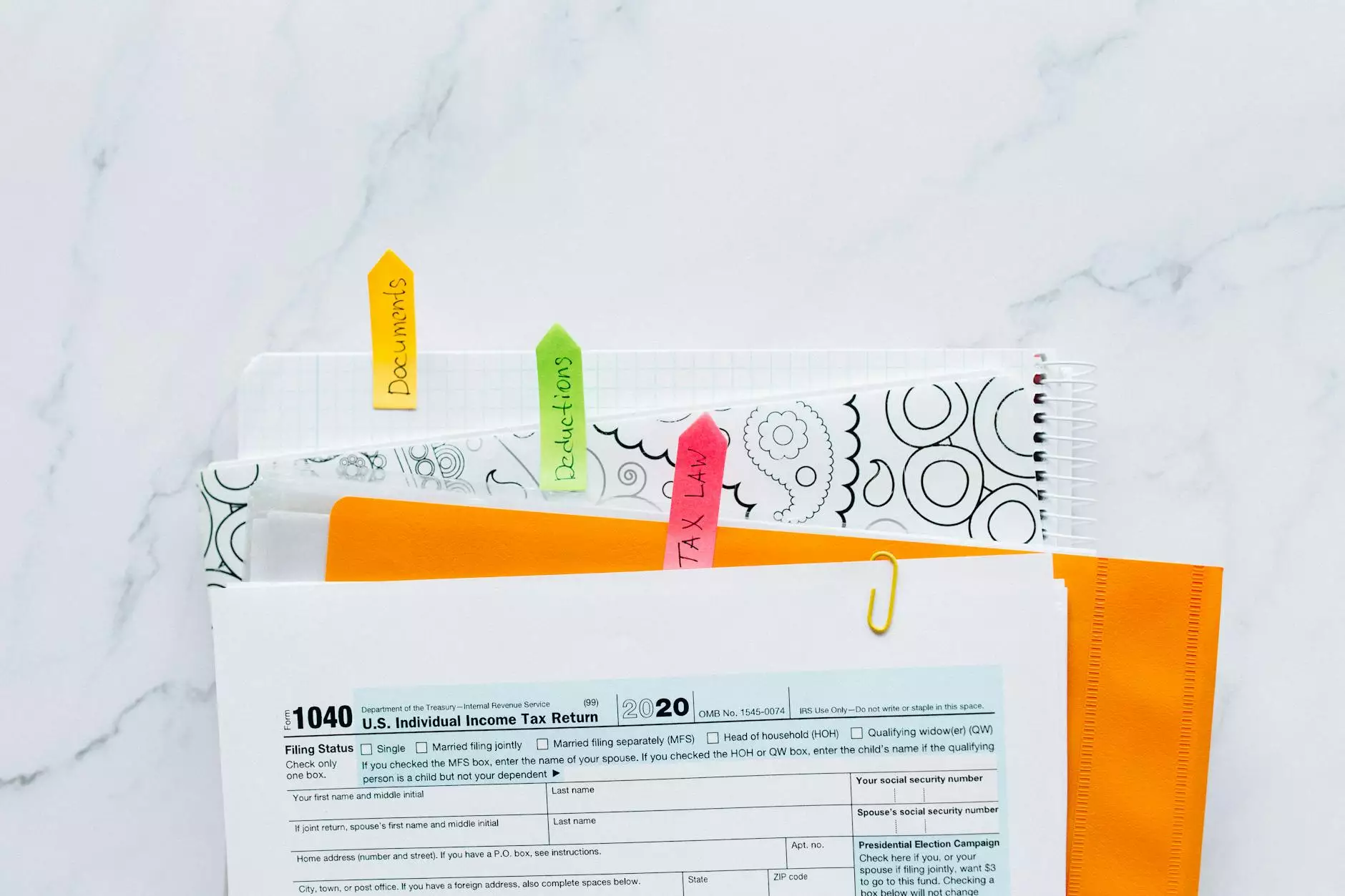Mastering Tax Planning for Small Businesses

In the dynamic world of small business, tax planning is not just a necessity; it's an art. Many entrepreneurs overlook the importance of tax planning, which can lead to missed opportunities for savings and growth. In this comprehensive guide, we will delve deep into strategies, tips, and insights to help you optimize your small business taxes effectively.
Understanding Tax Planning for Small Businesses
Tax planning involves analyzing your financial situation to maximize deductions, credits, and minimize tax liabilities. It's an ongoing process that requires attention to both the current tax laws and future implications affecting your business. Strategic tax planning can result in significant savings.
Benefits of Effective Tax Planning
- Maximizes Deductions: Identify deductible expenses that can lower your taxable income.
- Increases Cash Flow: Effective planning can result in a lower tax bill, freeing up cash for investment.
- Aids in Compliance: Stay informed about tax laws to ensure your businesses follows regulations.
- Enhances Business Decisions: Knowing potential tax implications can inform your operational decisions.
Key Strategies for Tax Planning
Implementing a robust tax planning strategy can help small businesses thrive. Here are several strategies to consider:
1. Know Your Business Structure
The structure of your business—whether it's a sole proprietorship, partnership, LLC, or corporation—affects your tax obligations significantly. Different structures have varied implications on how income is taxed:
- Sole Proprietorship: Simple to establish but all income is taxed as personal income.
- Partnership: Profits are passed to partners and taxed on their personal tax returns.
- LLC: Offers flexibility in tax treatment; can choose to be taxed as a sole proprietorship or corporation.
- Corporation: Subject to double taxation; profits are taxed at the corporate level, then again when distributed as dividends.
2. Take Advantage of Tax Deductions
Every small business should aim to maximize deductions. Common deductions include:
- Operating Expenses: Rent, utilities, and office supplies.
- Employee Wages: Salaries and wages paid to employees are generally deductible.
- Home Office Deduction: If you qualify, you can deduct a portion of your home used exclusively for business.
- Vehicle Expenses: Keep accurate records of your business mileage.
3. Utilize Tax Credits
Tax credits directly reduce the amount of tax owed. Familiarize yourself with available credits, which can be a vital part of your tax planning strategy:
- Research and Development (R&D) Tax Credit: For businesses investing in innovation and development.
- Work Opportunity Tax Credit (WOTC): For hiring individuals from certain target groups.
- Small Business Health Care Tax Credit: Available for small businesses providing health insurance.
4. Timing Income and Expenses
Strategically timing income and expenses can be crucial. Consider deferring income to a future tax year or accelerating expenses into the current year to reduce your taxable income. This tactic requires careful planning and understanding of your cash flow.
5. Retirement Plans as Tax Savers
Establishing a retirement plan, like a SEP IRA, Simple IRA, or a 401(k), can provide significant tax benefits while securing your future. Contributions to these plans are often tax-deductible, effectively lowering your business income.
Building a Tax Strategy with a CPA
A Certified Public Accountant (CPA) specialized in small business taxes can be instrumental in developing an effective tax planning strategy. They bring insights into:
- Tax Law Updates: Keeping you informed about changes in tax legislation.
- Personalized Strategies: Tailoring approaches to fit your unique business model.
- Tax Preparation: Ensuring accuracy in filing to avoid penalties.
Choosing the Right CPA for Your Small Business
When selecting a CPA, prioritizing experience in small business tax matters is essential. Look for a CPA who:
- Has a Strong Reputation: Seek referrals and reviews from other small business owners.
- Offers a Full Range of Services: Beyond tax planning, they should assist in accounting and financial planning.
- Is Proactive: A good CPA offers insights throughout the year, not just during tax season.
Tax Planning for Growth: Looking Ahead
As your business grows, your tax planning strategies should evolve. Regularly review and adjust your tax strategies to align with your business goals. Consider these factors:
- Anticipating Growth: Understand how growth phases may affect tax liabilities and be prepared.
- Expanding Business Operations: Different regulations can apply when operating in multiple states.
- Investing in Technology and Innovation: Explore tax incentives for investing in technology upgrades.
Year-End Tax Planning Tips
As the year comes to a close, it's crucial to engage in strategic year-end tax planning:
- Review Your Financials: Ensure all records are accurate and up to date.
- Make Necessary Purchases: Consider buying equipment or supplies that could benefit your tax deductions.
- Consider Charitable Contributions: Donations can also provide deductions while supporting your community.
Conclusion: The Importance of Comprehensive Tax Planning
In conclusion, comprehensive tax planning is vital for small businesses looking to thrive and grow. Understanding your obligations, taking advantage of deductions and credits, and strategically planning for the future can save you substantial amounts on taxes. Partnering with a skilled CPA can further enhance your tax strategy, ensuring you're making the most of every opportunity available to you.
To optimize your tax liability and ensure your business’s prosperity, start implementing these strategies today and consider reaching out to experienced professionals at Shandal CPA who specialize in small business tax planning.
tax planning small business








